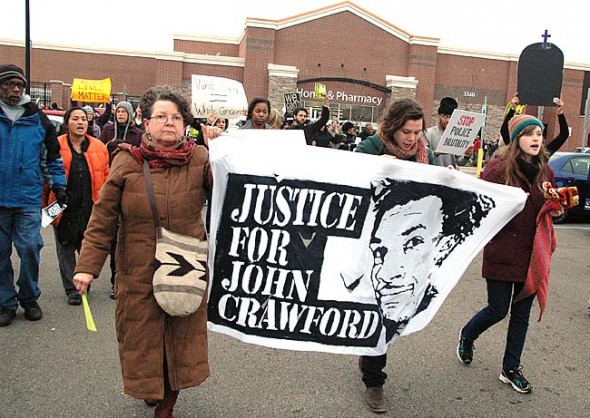
John and Maria Booth, left, and Liz Porter, center, with Antioch College students Lauren Gjessing and Rachel Humphreys carrying a banner, were among the many villagers who took part in a “die-in” protesting the police shooting of John Crawford last Saturday at the Beavercreek Walmart. About 200 protesters took part in the event, which caused Walmart to shut down the store for two hours. (Photos by Diane Chiddister)
Walmart protest draws Yellow Springs villagers
- Published: January 1, 2015
Organizers of last Saturday’s protest against the police shooting of John Crawford expected people to show up, just not quite so many.
“We expected about 150 people, but there were over 200,” said villager Bomani Moyenda. “The protest went beyond our expectations. We didn’t expect to shut down the store.”
A large group of protestors, including many from Yellow Springs, converged at 3 p.m. last Saturday in the Beavercreek Walmart’s pet department, where Crawford was shot and killed in August. Store officials attempted to stop the “die-in,” but the group refused to leave. At that point Walmart evacuated the store, closing it to customers for two hours on one of the busiest shopping days of the year. Several members of the Beavercreek police, along with attorneys allied with the protestors, stood by while participants sang and chanted. The Reverend Jerome McCorry of Dayton spoke briefly while a dozen protestors lay on the floor in the spot where Crawford had died, as other protestors looked on.
“I felt it was moving and respectful,” Kurt Miyazaki said of the event. “To be in this banal and commercial place, and to know someone was killed there, was moving to me.”
The Walmart location was chosen for the protest because “it is symbolic,” according to villager Julias Eason, who had proposed the idea. “The die-in represents those blacks whose lives have been lost.”
It was also appropriate to protest in the store because Walmart did not initially respond to public appeals to release the video of the Crawford shooting, Moyenda said. The video, which showed Crawford was not threatening shoppers, as a 911 caller had said, wasn’t released until after a grand jury ruled that the officers involved did nothing wrong.
In a response to the protest, Walmart National Media Relations Director Brian Nick at the company’s headquarters in Bentonville, Ark. referred this reporter to a statement the store released last week following the announcement that Crawford’s family had filed a wrongful death lawsuit against Beavercreek police.
“Our condolences go out to the families who lost loved ones,” the statement says. “Out of respect for everyone involved, we believe it’s not appropriate to discuss the specifics of this matter, but we can say that our associates acted properly. We take the safety and security of our stores very seriously so that Walmart remains a safe shopping experience for our customers.”
Walmart officials closed the store Saturday due to safety concerns, according to Nick in a phone interview on Monday.
“Our top priority is the safety of customers and associates,” he said. “When all of a sudden you have hundreds of individuals occupy a store,” customers are not able to move around safely.
Nick declined to say how much the store might have lost in sales during the closing.
In response to the concern that Walmart delayed releasing the video of the shooting, Nick stated that Walmart had been asked by police not to release the video until their investigation was completed.
“I would yield to law enforcement on that,” he said.
Bearing witness
While Moyenda didn’t expect so many people to show up at the protest, he wasn’t totally surprised that the event sparked a chord.
“People have a natural yearning for justice,” he said in a phone interview this week. “After watching the videos of the killings of John Crawford and Eric Garner [killed by police in New York], it’s obvious that there was blatant racism and that the system is not working.”
The Saturday protest grew from a meeting organized by Moyenda and Judith Hempfling around the Crawford shooting, which, though the first in a series of controversial police shootings of black men this summer and fall, seemed to be fading from public awareness. Only a few attended the meeting, but the group began holding Monday afternoon vigils at the Greene County Courthouse, where attendance has been growing.
“I’ve seen people get real passionate and real courageous about this,” Moyenda said.
Katie Egart attended the Saturday vigil because “I wanted to bear witness to what happened,” she said this week. “What happened to John Crawford was just wrong. And it happened in my neighborhood. I felt that he deserved that witnessing.”
During the die-in inside the store, the Rev. McCorry asked participants to call out why they had chosen to come. Mattie Fitch, 29, who grew up in Yellow Springs and now lives in Dayton, called out the words, “equality,” and “human dignity.”
“Those are the reasons I went,” she said this week. “I think a change needs to take place. I think part of a democracy is citizens voicing a movement for change.”
Fitch was at the Saturday protest with members of the World House Choir, directed by Cathy Roma.
On Saturday Roma led singing inside the Walmart during the protest, as participants joined in a 1930s labor movement song, “Which Side Are You On?”
“Music is a part of every social change,” Roma said this week. “Music brings us together as one voice.”
Roma feels committed to bringing social justice, and has been especially troubled by the Crawford shooting.
“There were so many egregious errors in the process and someone needs to be held accountable,” she said, calling the errors, “a tragedy added to the other tragedy” of Crawford’s death.
While Walmart officials had told the press they were not allowed in the store because it’s private property, protestors with cell phones recorded the events. Also recording were local filmmakers Steve Bognar and Julia Reichert, who have completed a short video on the Crawford killing, called “No Guns for Christmas,” on the New York Times website opinion page for Dec. 23. The filmmakers also made a video of the Saturday protest, which can be found at ysnews.com.
On Saturday, after completing the die-in, the protestors agreed to leave the store. Several police cars were parked at the curb outside the store, where the group continued to chant and sing. Police urged the protestors to disperse as some angry Walmart shoppers yelled their displeasure about the store’s closing.
As tensions rose, police arrested Elias Kelley of Wilberforce, who had refused to leave. Upset that police had chosen to arrest a young black man, Sandy King of Yellow Springs went from officer to officer asking why a black man was being targeted, and found herself arrested as well. Police also arrested two others who had sat down in front of police cars.
King and Kelley were driven by Beavercreek police to the Fairborn Police Department, according to King this week. In the cruiser, the two sang a Holly Near song that included the line, “We are black and white together and we are singing for our lives.”
King was placed in a holding cell, which she found to be “very clean,” and also a good spot for prayer and meditation. After about an hour attorney Ellis Jacobs posted bail of $255, and she was released, having been charged with trespassing, obstructing official business and resisting arrest.
At Walmart, more and more police cars, sirens blaring, converged in the parking lot. More than 20 police cars and 50 officers, with police from Bellbrook, Sugarcreek Township, Kettering, Dayton, Greene County Sheriff’s Department, Fairborn, Central State, Wright State, Montgomery County and Ohio State Police were represented. At this point, die-in leaders asked protestors to disperse.
Beavercreek police did not return phone calls seeking comment this week.
Saturday’s event was “just the beginning,” according to organizer Eason. “It was a statement of intent.”
The interest in the Crawford shooting, and in the recent police shootings of black Americans, is growing across the country because “the issue speaks in different ways to different people, including those concerned with police brutality, racial injustice or police militarization,” he said.
A Buddhist and student of the writings of Pema Chodron, King is very concerned that those protesting in the growing movement maintain nonviolence as a guiding principle.
“We have to stand up without violence,” she said this week. “That’s the most important thing about this movement.”
Moyenda encourages all interested people to join the group at the weekly vigil at the Greene County Courthouse, on Mondays beginning at 4:30 p.m.
“We want to increase the opportunities for justice,” he said.
The Yellow Springs News encourages respectful discussion of this article.
You must login to post a comment.
Don't have a login? Register for a free YSNews.com account.




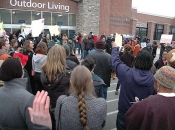

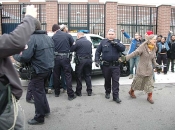
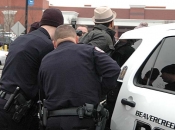
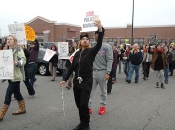
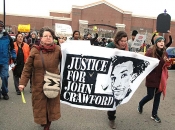
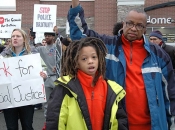
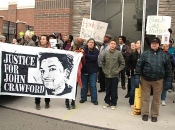








No comments yet for this article.